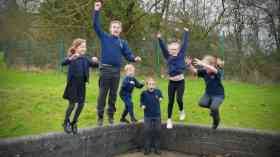In November 2020 I was told I had 6 months left to live and was at risk of sudden death, due to a colloid cyst in my brain.
Supplier Focus
Latest Supplier News
Borg & Overström is a UK manufacturer of premium drinking water solutions. For over 20 years Borg & Overström has developed sustainable, bottle-less, hygienic, drinking water dispensers with the aim to provide exceptional, safe, self-service drinking water into schools, universities, workplaces and communal spaces.

 Amy was 15 years old when she took part in a pilot project at the Eden Project. She had never been that interested or engaged in the issues surrounding sustainability and climate change- mainly, she says, due to a lack of knowledge: “I didn’t really know what was going on so you can’t have an opinion on it.”
Amy was 15 years old when she took part in a pilot project at the Eden Project. She had never been that interested or engaged in the issues surrounding sustainability and climate change- mainly, she says, due to a lack of knowledge: “I didn’t really know what was going on so you can’t have an opinion on it.”








